Business Law: Understanding Contract Elements and Discharge Methods
VerifiedAdded on 2023/06/15
|9
|2810
|375
Report
AI Summary
This report provides a comprehensive overview of key elements in contract law, including the necessity of agreement, consideration, capability of parties, intention, and certainty for a contract to be valid. It delves into the significance of intention, highlighting how it differentiates legally enforceable contracts from social agreements, using case laws like Jones v Padavatton and Simpkins v Pays. The report also discusses misrepresentation, distinguishing between fraudulent, negligent, and innocent types, and their implications on contract validity. Finally, it explores various methods of contract discharge, such as performance, agreement, breach, and frustration, supported by relevant case laws, offering a thorough understanding of contract law principles. Desklib provides access to this and many other solved assignments for students.

Running head: BUSINESS LAW 0
Business Law
Contracts
Business Law
Contracts
Paraphrase This Document
Need a fresh take? Get an instant paraphrase of this document with our AI Paraphraser
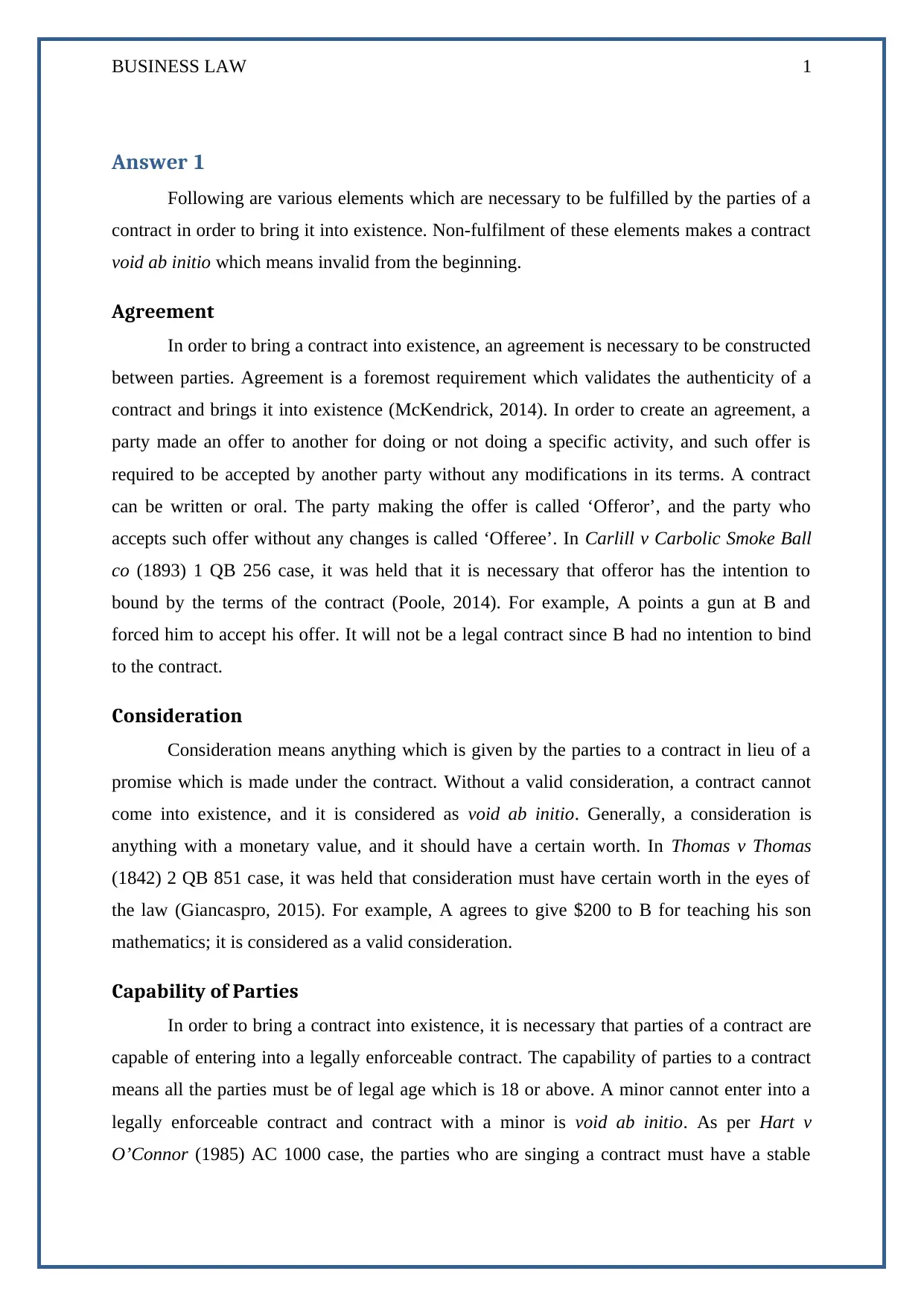
BUSINESS LAW 1
Answer 1
Following are various elements which are necessary to be fulfilled by the parties of a
contract in order to bring it into existence. Non-fulfilment of these elements makes a contract
void ab initio which means invalid from the beginning.
Agreement
In order to bring a contract into existence, an agreement is necessary to be constructed
between parties. Agreement is a foremost requirement which validates the authenticity of a
contract and brings it into existence (McKendrick, 2014). In order to create an agreement, a
party made an offer to another for doing or not doing a specific activity, and such offer is
required to be accepted by another party without any modifications in its terms. A contract
can be written or oral. The party making the offer is called ‘Offeror’, and the party who
accepts such offer without any changes is called ‘Offeree’. In Carlill v Carbolic Smoke Ball
co (1893) 1 QB 256 case, it was held that it is necessary that offeror has the intention to
bound by the terms of the contract (Poole, 2014). For example, A points a gun at B and
forced him to accept his offer. It will not be a legal contract since B had no intention to bind
to the contract.
Consideration
Consideration means anything which is given by the parties to a contract in lieu of a
promise which is made under the contract. Without a valid consideration, a contract cannot
come into existence, and it is considered as void ab initio. Generally, a consideration is
anything with a monetary value, and it should have a certain worth. In Thomas v Thomas
(1842) 2 QB 851 case, it was held that consideration must have certain worth in the eyes of
the law (Giancaspro, 2015). For example, A agrees to give $200 to B for teaching his son
mathematics; it is considered as a valid consideration.
Capability of Parties
In order to bring a contract into existence, it is necessary that parties of a contract are
capable of entering into a legally enforceable contract. The capability of parties to a contract
means all the parties must be of legal age which is 18 or above. A minor cannot enter into a
legally enforceable contract and contract with a minor is void ab initio. As per Hart v
O’Connor (1985) AC 1000 case, the parties who are singing a contract must have a stable
Answer 1
Following are various elements which are necessary to be fulfilled by the parties of a
contract in order to bring it into existence. Non-fulfilment of these elements makes a contract
void ab initio which means invalid from the beginning.
Agreement
In order to bring a contract into existence, an agreement is necessary to be constructed
between parties. Agreement is a foremost requirement which validates the authenticity of a
contract and brings it into existence (McKendrick, 2014). In order to create an agreement, a
party made an offer to another for doing or not doing a specific activity, and such offer is
required to be accepted by another party without any modifications in its terms. A contract
can be written or oral. The party making the offer is called ‘Offeror’, and the party who
accepts such offer without any changes is called ‘Offeree’. In Carlill v Carbolic Smoke Ball
co (1893) 1 QB 256 case, it was held that it is necessary that offeror has the intention to
bound by the terms of the contract (Poole, 2014). For example, A points a gun at B and
forced him to accept his offer. It will not be a legal contract since B had no intention to bind
to the contract.
Consideration
Consideration means anything which is given by the parties to a contract in lieu of a
promise which is made under the contract. Without a valid consideration, a contract cannot
come into existence, and it is considered as void ab initio. Generally, a consideration is
anything with a monetary value, and it should have a certain worth. In Thomas v Thomas
(1842) 2 QB 851 case, it was held that consideration must have certain worth in the eyes of
the law (Giancaspro, 2015). For example, A agrees to give $200 to B for teaching his son
mathematics; it is considered as a valid consideration.
Capability of Parties
In order to bring a contract into existence, it is necessary that parties of a contract are
capable of entering into a legally enforceable contract. The capability of parties to a contract
means all the parties must be of legal age which is 18 or above. A minor cannot enter into a
legally enforceable contract and contract with a minor is void ab initio. As per Hart v
O’Connor (1985) AC 1000 case, the parties who are singing a contract must have a stable
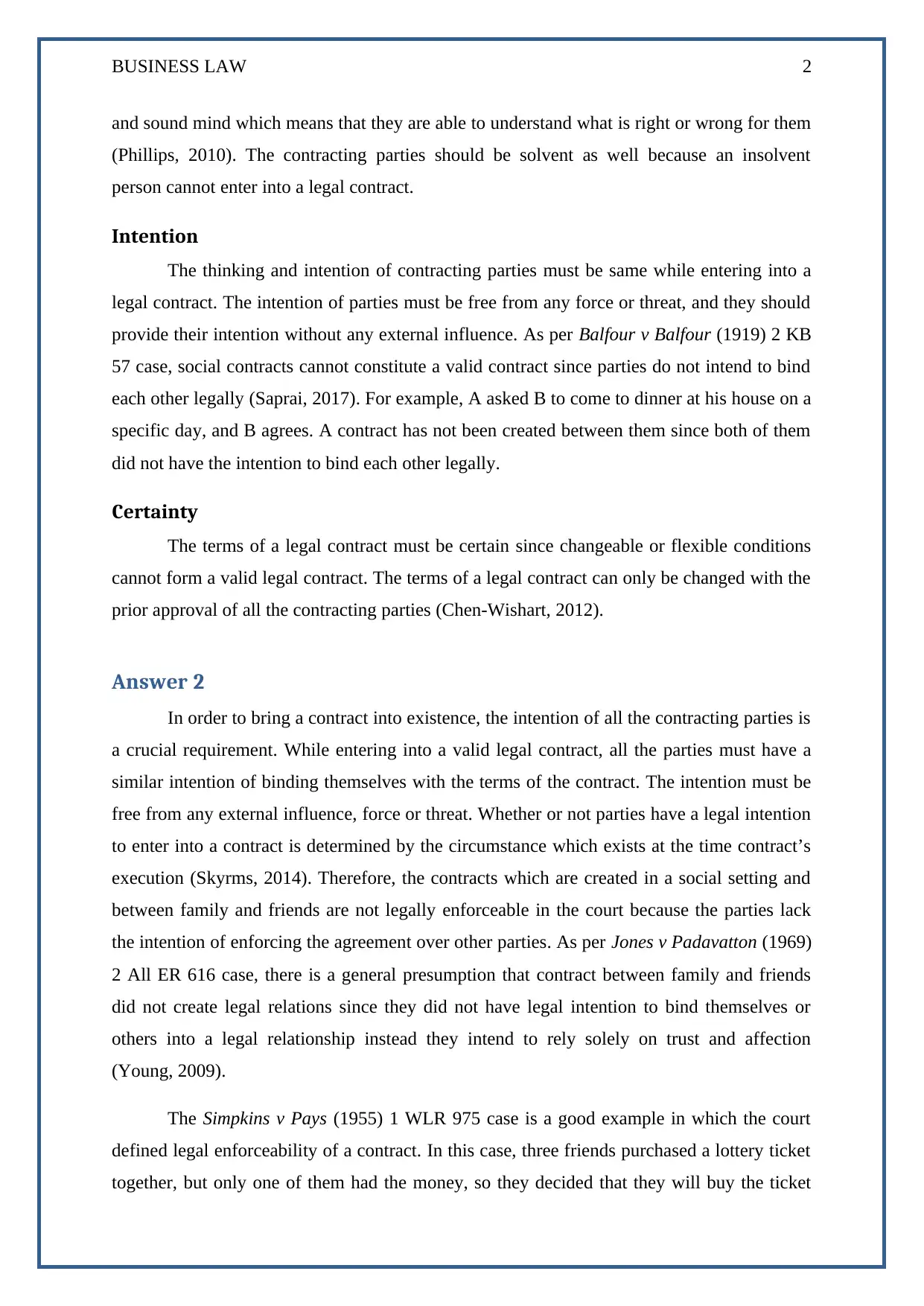
BUSINESS LAW 2
and sound mind which means that they are able to understand what is right or wrong for them
(Phillips, 2010). The contracting parties should be solvent as well because an insolvent
person cannot enter into a legal contract.
Intention
The thinking and intention of contracting parties must be same while entering into a
legal contract. The intention of parties must be free from any force or threat, and they should
provide their intention without any external influence. As per Balfour v Balfour (1919) 2 KB
57 case, social contracts cannot constitute a valid contract since parties do not intend to bind
each other legally (Saprai, 2017). For example, A asked B to come to dinner at his house on a
specific day, and B agrees. A contract has not been created between them since both of them
did not have the intention to bind each other legally.
Certainty
The terms of a legal contract must be certain since changeable or flexible conditions
cannot form a valid legal contract. The terms of a legal contract can only be changed with the
prior approval of all the contracting parties (Chen-Wishart, 2012).
Answer 2
In order to bring a contract into existence, the intention of all the contracting parties is
a crucial requirement. While entering into a valid legal contract, all the parties must have a
similar intention of binding themselves with the terms of the contract. The intention must be
free from any external influence, force or threat. Whether or not parties have a legal intention
to enter into a contract is determined by the circumstance which exists at the time contract’s
execution (Skyrms, 2014). Therefore, the contracts which are created in a social setting and
between family and friends are not legally enforceable in the court because the parties lack
the intention of enforcing the agreement over other parties. As per Jones v Padavatton (1969)
2 All ER 616 case, there is a general presumption that contract between family and friends
did not create legal relations since they did not have legal intention to bind themselves or
others into a legal relationship instead they intend to rely solely on trust and affection
(Young, 2009).
The Simpkins v Pays (1955) 1 WLR 975 case is a good example in which the court
defined legal enforceability of a contract. In this case, three friends purchased a lottery ticket
together, but only one of them had the money, so they decided that they will buy the ticket
and sound mind which means that they are able to understand what is right or wrong for them
(Phillips, 2010). The contracting parties should be solvent as well because an insolvent
person cannot enter into a legal contract.
Intention
The thinking and intention of contracting parties must be same while entering into a
legal contract. The intention of parties must be free from any force or threat, and they should
provide their intention without any external influence. As per Balfour v Balfour (1919) 2 KB
57 case, social contracts cannot constitute a valid contract since parties do not intend to bind
each other legally (Saprai, 2017). For example, A asked B to come to dinner at his house on a
specific day, and B agrees. A contract has not been created between them since both of them
did not have the intention to bind each other legally.
Certainty
The terms of a legal contract must be certain since changeable or flexible conditions
cannot form a valid legal contract. The terms of a legal contract can only be changed with the
prior approval of all the contracting parties (Chen-Wishart, 2012).
Answer 2
In order to bring a contract into existence, the intention of all the contracting parties is
a crucial requirement. While entering into a valid legal contract, all the parties must have a
similar intention of binding themselves with the terms of the contract. The intention must be
free from any external influence, force or threat. Whether or not parties have a legal intention
to enter into a contract is determined by the circumstance which exists at the time contract’s
execution (Skyrms, 2014). Therefore, the contracts which are created in a social setting and
between family and friends are not legally enforceable in the court because the parties lack
the intention of enforcing the agreement over other parties. As per Jones v Padavatton (1969)
2 All ER 616 case, there is a general presumption that contract between family and friends
did not create legal relations since they did not have legal intention to bind themselves or
others into a legal relationship instead they intend to rely solely on trust and affection
(Young, 2009).
The Simpkins v Pays (1955) 1 WLR 975 case is a good example in which the court
defined legal enforceability of a contract. In this case, three friends purchased a lottery ticket
together, but only one of them had the money, so they decided that they will buy the ticket
⊘ This is a preview!⊘
Do you want full access?
Subscribe today to unlock all pages.

Trusted by 1+ million students worldwide
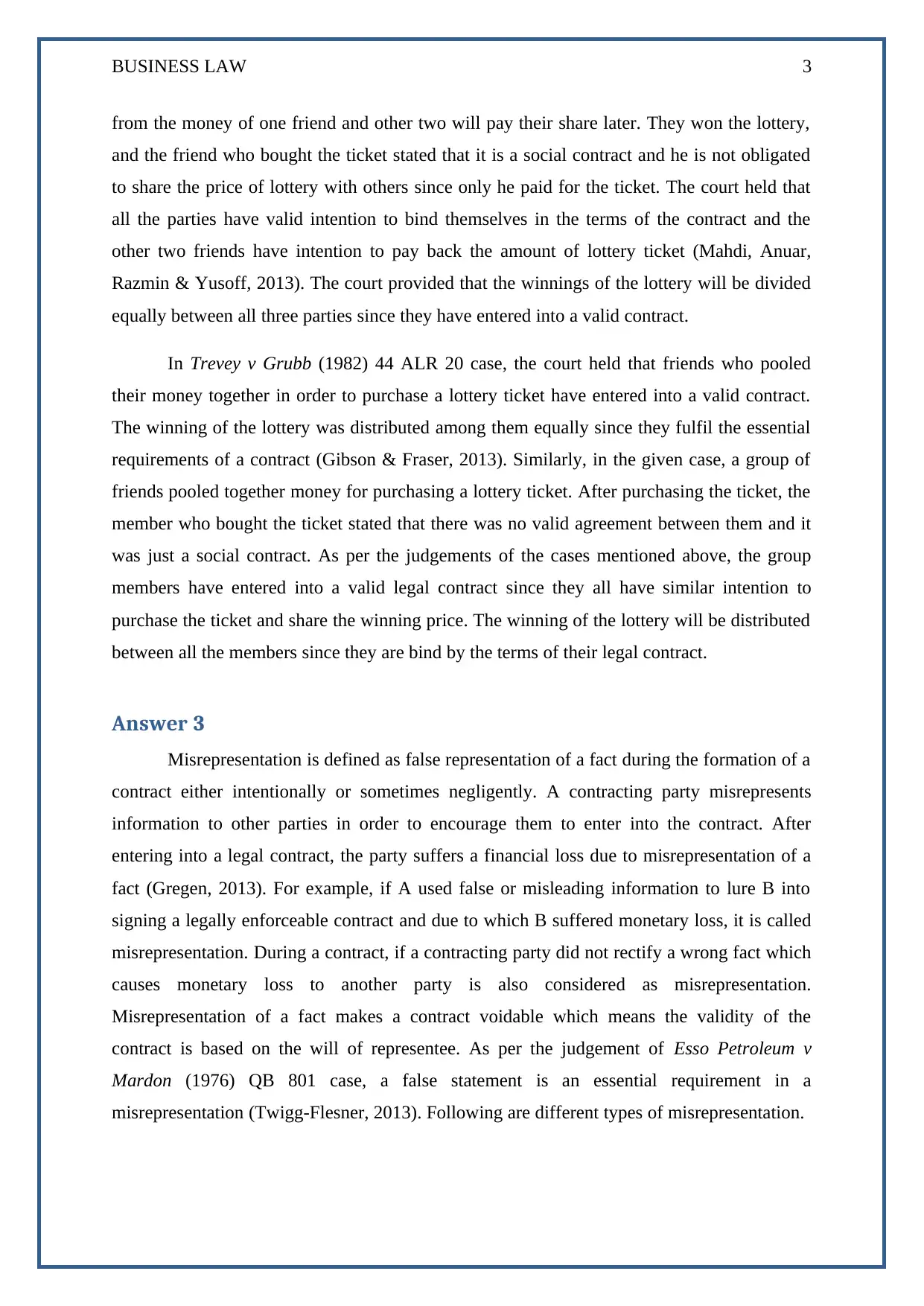
BUSINESS LAW 3
from the money of one friend and other two will pay their share later. They won the lottery,
and the friend who bought the ticket stated that it is a social contract and he is not obligated
to share the price of lottery with others since only he paid for the ticket. The court held that
all the parties have valid intention to bind themselves in the terms of the contract and the
other two friends have intention to pay back the amount of lottery ticket (Mahdi, Anuar,
Razmin & Yusoff, 2013). The court provided that the winnings of the lottery will be divided
equally between all three parties since they have entered into a valid contract.
In Trevey v Grubb (1982) 44 ALR 20 case, the court held that friends who pooled
their money together in order to purchase a lottery ticket have entered into a valid contract.
The winning of the lottery was distributed among them equally since they fulfil the essential
requirements of a contract (Gibson & Fraser, 2013). Similarly, in the given case, a group of
friends pooled together money for purchasing a lottery ticket. After purchasing the ticket, the
member who bought the ticket stated that there was no valid agreement between them and it
was just a social contract. As per the judgements of the cases mentioned above, the group
members have entered into a valid legal contract since they all have similar intention to
purchase the ticket and share the winning price. The winning of the lottery will be distributed
between all the members since they are bind by the terms of their legal contract.
Answer 3
Misrepresentation is defined as false representation of a fact during the formation of a
contract either intentionally or sometimes negligently. A contracting party misrepresents
information to other parties in order to encourage them to enter into the contract. After
entering into a legal contract, the party suffers a financial loss due to misrepresentation of a
fact (Gregen, 2013). For example, if A used false or misleading information to lure B into
signing a legally enforceable contract and due to which B suffered monetary loss, it is called
misrepresentation. During a contract, if a contracting party did not rectify a wrong fact which
causes monetary loss to another party is also considered as misrepresentation.
Misrepresentation of a fact makes a contract voidable which means the validity of the
contract is based on the will of representee. As per the judgement of Esso Petroleum v
Mardon (1976) QB 801 case, a false statement is an essential requirement in a
misrepresentation (Twigg-Flesner, 2013). Following are different types of misrepresentation.
from the money of one friend and other two will pay their share later. They won the lottery,
and the friend who bought the ticket stated that it is a social contract and he is not obligated
to share the price of lottery with others since only he paid for the ticket. The court held that
all the parties have valid intention to bind themselves in the terms of the contract and the
other two friends have intention to pay back the amount of lottery ticket (Mahdi, Anuar,
Razmin & Yusoff, 2013). The court provided that the winnings of the lottery will be divided
equally between all three parties since they have entered into a valid contract.
In Trevey v Grubb (1982) 44 ALR 20 case, the court held that friends who pooled
their money together in order to purchase a lottery ticket have entered into a valid contract.
The winning of the lottery was distributed among them equally since they fulfil the essential
requirements of a contract (Gibson & Fraser, 2013). Similarly, in the given case, a group of
friends pooled together money for purchasing a lottery ticket. After purchasing the ticket, the
member who bought the ticket stated that there was no valid agreement between them and it
was just a social contract. As per the judgements of the cases mentioned above, the group
members have entered into a valid legal contract since they all have similar intention to
purchase the ticket and share the winning price. The winning of the lottery will be distributed
between all the members since they are bind by the terms of their legal contract.
Answer 3
Misrepresentation is defined as false representation of a fact during the formation of a
contract either intentionally or sometimes negligently. A contracting party misrepresents
information to other parties in order to encourage them to enter into the contract. After
entering into a legal contract, the party suffers a financial loss due to misrepresentation of a
fact (Gregen, 2013). For example, if A used false or misleading information to lure B into
signing a legally enforceable contract and due to which B suffered monetary loss, it is called
misrepresentation. During a contract, if a contracting party did not rectify a wrong fact which
causes monetary loss to another party is also considered as misrepresentation.
Misrepresentation of a fact makes a contract voidable which means the validity of the
contract is based on the will of representee. As per the judgement of Esso Petroleum v
Mardon (1976) QB 801 case, a false statement is an essential requirement in a
misrepresentation (Twigg-Flesner, 2013). Following are different types of misrepresentation.
Paraphrase This Document
Need a fresh take? Get an instant paraphrase of this document with our AI Paraphraser
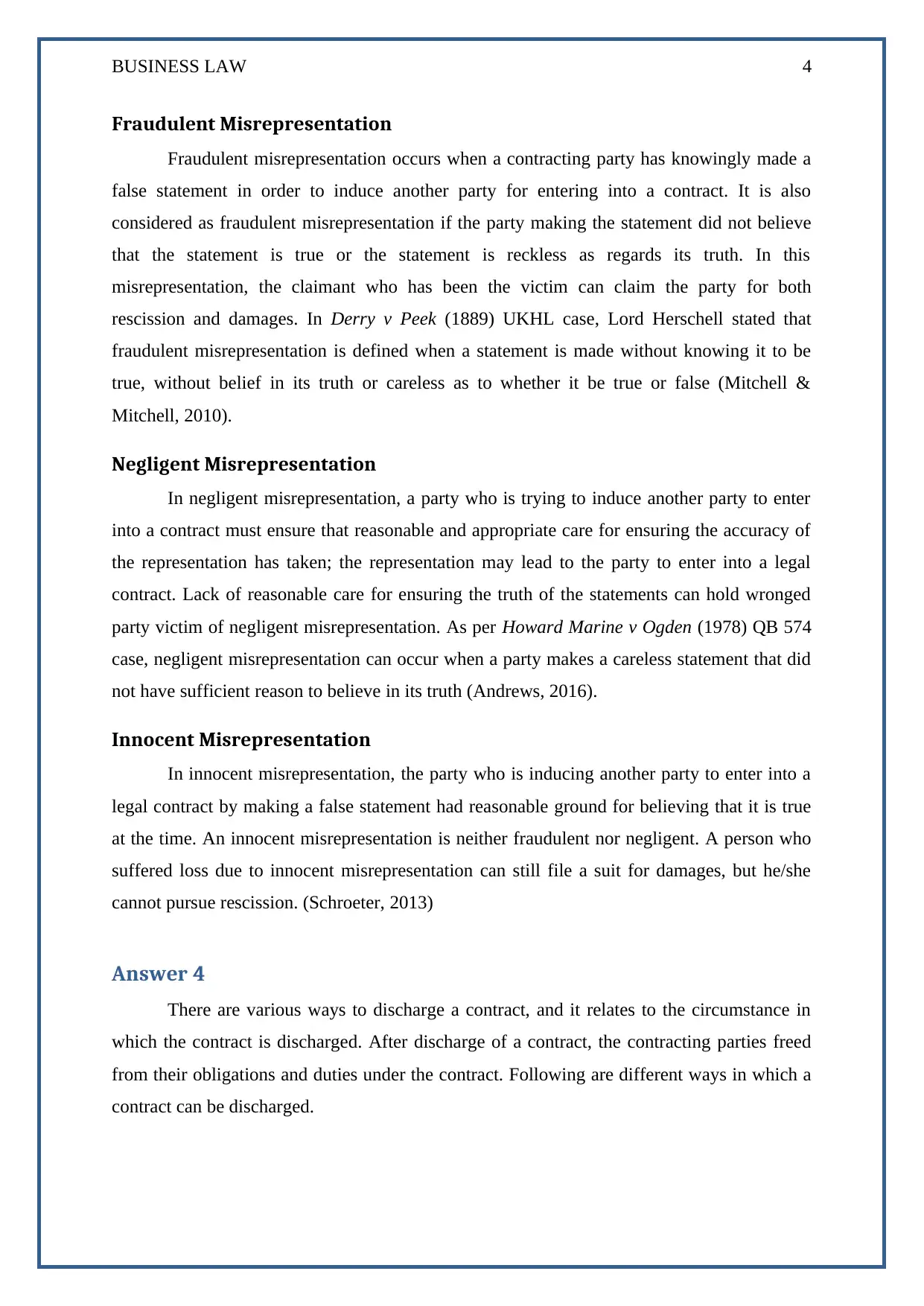
BUSINESS LAW 4
Fraudulent Misrepresentation
Fraudulent misrepresentation occurs when a contracting party has knowingly made a
false statement in order to induce another party for entering into a contract. It is also
considered as fraudulent misrepresentation if the party making the statement did not believe
that the statement is true or the statement is reckless as regards its truth. In this
misrepresentation, the claimant who has been the victim can claim the party for both
rescission and damages. In Derry v Peek (1889) UKHL case, Lord Herschell stated that
fraudulent misrepresentation is defined when a statement is made without knowing it to be
true, without belief in its truth or careless as to whether it be true or false (Mitchell &
Mitchell, 2010).
Negligent Misrepresentation
In negligent misrepresentation, a party who is trying to induce another party to enter
into a contract must ensure that reasonable and appropriate care for ensuring the accuracy of
the representation has taken; the representation may lead to the party to enter into a legal
contract. Lack of reasonable care for ensuring the truth of the statements can hold wronged
party victim of negligent misrepresentation. As per Howard Marine v Ogden (1978) QB 574
case, negligent misrepresentation can occur when a party makes a careless statement that did
not have sufficient reason to believe in its truth (Andrews, 2016).
Innocent Misrepresentation
In innocent misrepresentation, the party who is inducing another party to enter into a
legal contract by making a false statement had reasonable ground for believing that it is true
at the time. An innocent misrepresentation is neither fraudulent nor negligent. A person who
suffered loss due to innocent misrepresentation can still file a suit for damages, but he/she
cannot pursue rescission. (Schroeter, 2013)
Answer 4
There are various ways to discharge a contract, and it relates to the circumstance in
which the contract is discharged. After discharge of a contract, the contracting parties freed
from their obligations and duties under the contract. Following are different ways in which a
contract can be discharged.
Fraudulent Misrepresentation
Fraudulent misrepresentation occurs when a contracting party has knowingly made a
false statement in order to induce another party for entering into a contract. It is also
considered as fraudulent misrepresentation if the party making the statement did not believe
that the statement is true or the statement is reckless as regards its truth. In this
misrepresentation, the claimant who has been the victim can claim the party for both
rescission and damages. In Derry v Peek (1889) UKHL case, Lord Herschell stated that
fraudulent misrepresentation is defined when a statement is made without knowing it to be
true, without belief in its truth or careless as to whether it be true or false (Mitchell &
Mitchell, 2010).
Negligent Misrepresentation
In negligent misrepresentation, a party who is trying to induce another party to enter
into a contract must ensure that reasonable and appropriate care for ensuring the accuracy of
the representation has taken; the representation may lead to the party to enter into a legal
contract. Lack of reasonable care for ensuring the truth of the statements can hold wronged
party victim of negligent misrepresentation. As per Howard Marine v Ogden (1978) QB 574
case, negligent misrepresentation can occur when a party makes a careless statement that did
not have sufficient reason to believe in its truth (Andrews, 2016).
Innocent Misrepresentation
In innocent misrepresentation, the party who is inducing another party to enter into a
legal contract by making a false statement had reasonable ground for believing that it is true
at the time. An innocent misrepresentation is neither fraudulent nor negligent. A person who
suffered loss due to innocent misrepresentation can still file a suit for damages, but he/she
cannot pursue rescission. (Schroeter, 2013)
Answer 4
There are various ways to discharge a contract, and it relates to the circumstance in
which the contract is discharged. After discharge of a contract, the contracting parties freed
from their obligations and duties under the contract. Following are different ways in which a
contract can be discharged.
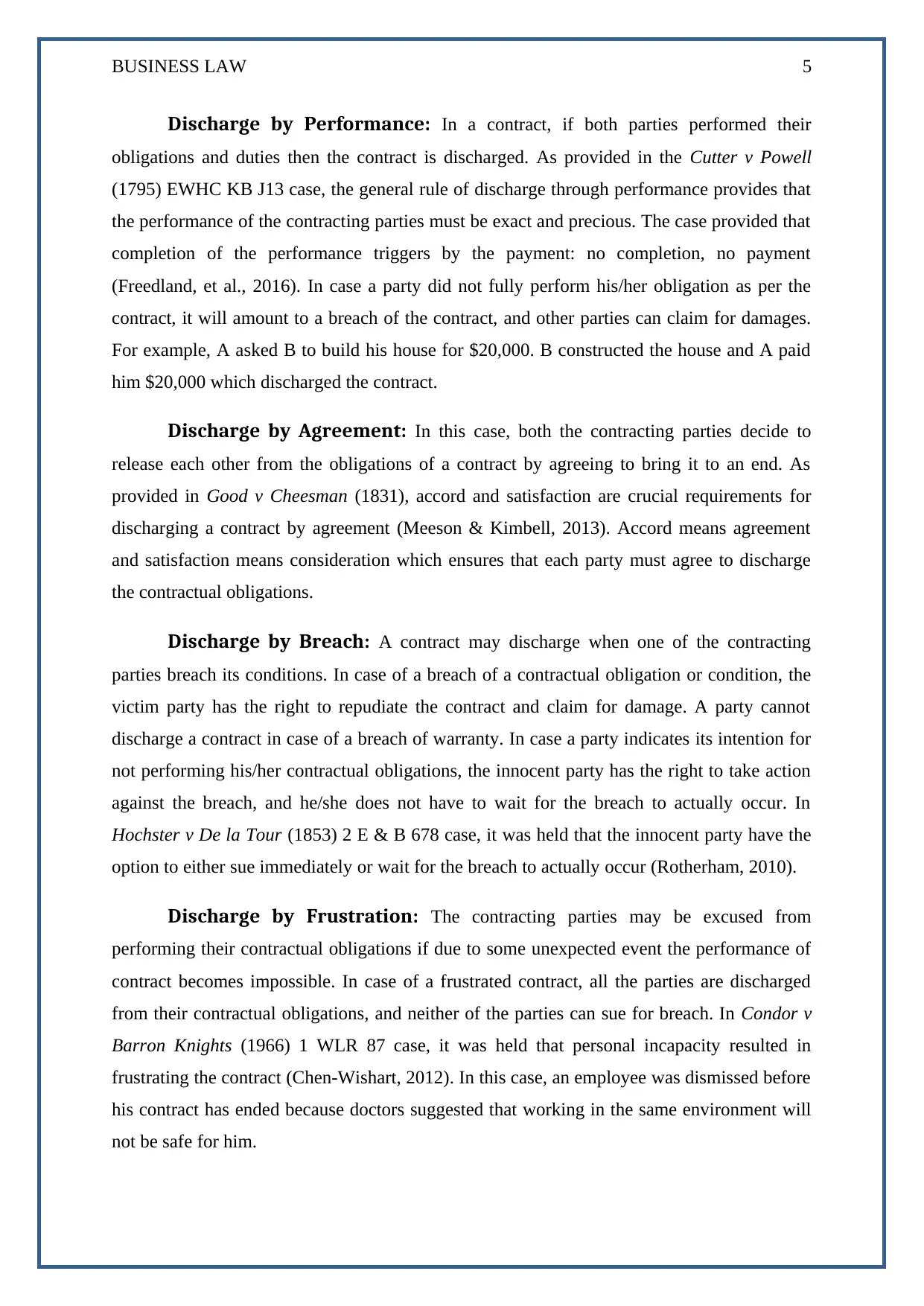
BUSINESS LAW 5
Discharge by Performance: In a contract, if both parties performed their
obligations and duties then the contract is discharged. As provided in the Cutter v Powell
(1795) EWHC KB J13 case, the general rule of discharge through performance provides that
the performance of the contracting parties must be exact and precious. The case provided that
completion of the performance triggers by the payment: no completion, no payment
(Freedland, et al., 2016). In case a party did not fully perform his/her obligation as per the
contract, it will amount to a breach of the contract, and other parties can claim for damages.
For example, A asked B to build his house for $20,000. B constructed the house and A paid
him $20,000 which discharged the contract.
Discharge by Agreement: In this case, both the contracting parties decide to
release each other from the obligations of a contract by agreeing to bring it to an end. As
provided in Good v Cheesman (1831), accord and satisfaction are crucial requirements for
discharging a contract by agreement (Meeson & Kimbell, 2013). Accord means agreement
and satisfaction means consideration which ensures that each party must agree to discharge
the contractual obligations.
Discharge by Breach: A contract may discharge when one of the contracting
parties breach its conditions. In case of a breach of a contractual obligation or condition, the
victim party has the right to repudiate the contract and claim for damage. A party cannot
discharge a contract in case of a breach of warranty. In case a party indicates its intention for
not performing his/her contractual obligations, the innocent party has the right to take action
against the breach, and he/she does not have to wait for the breach to actually occur. In
Hochster v De la Tour (1853) 2 E & B 678 case, it was held that the innocent party have the
option to either sue immediately or wait for the breach to actually occur (Rotherham, 2010).
Discharge by Frustration: The contracting parties may be excused from
performing their contractual obligations if due to some unexpected event the performance of
contract becomes impossible. In case of a frustrated contract, all the parties are discharged
from their contractual obligations, and neither of the parties can sue for breach. In Condor v
Barron Knights (1966) 1 WLR 87 case, it was held that personal incapacity resulted in
frustrating the contract (Chen-Wishart, 2012). In this case, an employee was dismissed before
his contract has ended because doctors suggested that working in the same environment will
not be safe for him.
Discharge by Performance: In a contract, if both parties performed their
obligations and duties then the contract is discharged. As provided in the Cutter v Powell
(1795) EWHC KB J13 case, the general rule of discharge through performance provides that
the performance of the contracting parties must be exact and precious. The case provided that
completion of the performance triggers by the payment: no completion, no payment
(Freedland, et al., 2016). In case a party did not fully perform his/her obligation as per the
contract, it will amount to a breach of the contract, and other parties can claim for damages.
For example, A asked B to build his house for $20,000. B constructed the house and A paid
him $20,000 which discharged the contract.
Discharge by Agreement: In this case, both the contracting parties decide to
release each other from the obligations of a contract by agreeing to bring it to an end. As
provided in Good v Cheesman (1831), accord and satisfaction are crucial requirements for
discharging a contract by agreement (Meeson & Kimbell, 2013). Accord means agreement
and satisfaction means consideration which ensures that each party must agree to discharge
the contractual obligations.
Discharge by Breach: A contract may discharge when one of the contracting
parties breach its conditions. In case of a breach of a contractual obligation or condition, the
victim party has the right to repudiate the contract and claim for damage. A party cannot
discharge a contract in case of a breach of warranty. In case a party indicates its intention for
not performing his/her contractual obligations, the innocent party has the right to take action
against the breach, and he/she does not have to wait for the breach to actually occur. In
Hochster v De la Tour (1853) 2 E & B 678 case, it was held that the innocent party have the
option to either sue immediately or wait for the breach to actually occur (Rotherham, 2010).
Discharge by Frustration: The contracting parties may be excused from
performing their contractual obligations if due to some unexpected event the performance of
contract becomes impossible. In case of a frustrated contract, all the parties are discharged
from their contractual obligations, and neither of the parties can sue for breach. In Condor v
Barron Knights (1966) 1 WLR 87 case, it was held that personal incapacity resulted in
frustrating the contract (Chen-Wishart, 2012). In this case, an employee was dismissed before
his contract has ended because doctors suggested that working in the same environment will
not be safe for him.
⊘ This is a preview!⊘
Do you want full access?
Subscribe today to unlock all pages.

Trusted by 1+ million students worldwide

BUSINESS LAW 6
Paraphrase This Document
Need a fresh take? Get an instant paraphrase of this document with our AI Paraphraser
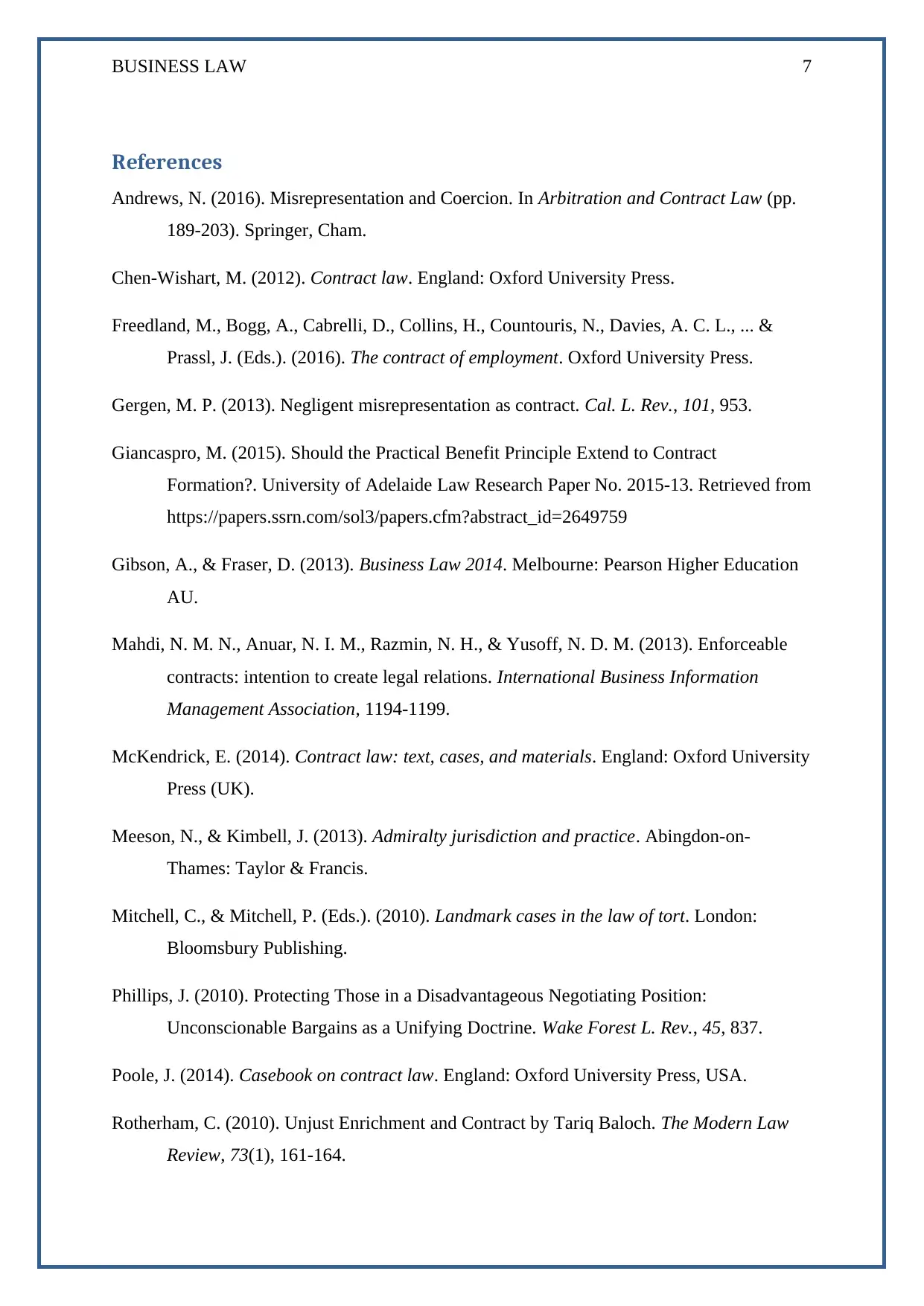
BUSINESS LAW 7
References
Andrews, N. (2016). Misrepresentation and Coercion. In Arbitration and Contract Law (pp.
189-203). Springer, Cham.
Chen-Wishart, M. (2012). Contract law. England: Oxford University Press.
Freedland, M., Bogg, A., Cabrelli, D., Collins, H., Countouris, N., Davies, A. C. L., ... &
Prassl, J. (Eds.). (2016). The contract of employment. Oxford University Press.
Gergen, M. P. (2013). Negligent misrepresentation as contract. Cal. L. Rev., 101, 953.
Giancaspro, M. (2015). Should the Practical Benefit Principle Extend to Contract
Formation?. University of Adelaide Law Research Paper No. 2015-13. Retrieved from
https://papers.ssrn.com/sol3/papers.cfm?abstract_id=2649759
Gibson, A., & Fraser, D. (2013). Business Law 2014. Melbourne: Pearson Higher Education
AU.
Mahdi, N. M. N., Anuar, N. I. M., Razmin, N. H., & Yusoff, N. D. M. (2013). Enforceable
contracts: intention to create legal relations. International Business Information
Management Association, 1194-1199.
McKendrick, E. (2014). Contract law: text, cases, and materials. England: Oxford University
Press (UK).
Meeson, N., & Kimbell, J. (2013). Admiralty jurisdiction and practice. Abingdon-on-
Thames: Taylor & Francis.
Mitchell, C., & Mitchell, P. (Eds.). (2010). Landmark cases in the law of tort. London:
Bloomsbury Publishing.
Phillips, J. (2010). Protecting Those in a Disadvantageous Negotiating Position:
Unconscionable Bargains as a Unifying Doctrine. Wake Forest L. Rev., 45, 837.
Poole, J. (2014). Casebook on contract law. England: Oxford University Press, USA.
Rotherham, C. (2010). Unjust Enrichment and Contract by Tariq Baloch. The Modern Law
Review, 73(1), 161-164.
References
Andrews, N. (2016). Misrepresentation and Coercion. In Arbitration and Contract Law (pp.
189-203). Springer, Cham.
Chen-Wishart, M. (2012). Contract law. England: Oxford University Press.
Freedland, M., Bogg, A., Cabrelli, D., Collins, H., Countouris, N., Davies, A. C. L., ... &
Prassl, J. (Eds.). (2016). The contract of employment. Oxford University Press.
Gergen, M. P. (2013). Negligent misrepresentation as contract. Cal. L. Rev., 101, 953.
Giancaspro, M. (2015). Should the Practical Benefit Principle Extend to Contract
Formation?. University of Adelaide Law Research Paper No. 2015-13. Retrieved from
https://papers.ssrn.com/sol3/papers.cfm?abstract_id=2649759
Gibson, A., & Fraser, D. (2013). Business Law 2014. Melbourne: Pearson Higher Education
AU.
Mahdi, N. M. N., Anuar, N. I. M., Razmin, N. H., & Yusoff, N. D. M. (2013). Enforceable
contracts: intention to create legal relations. International Business Information
Management Association, 1194-1199.
McKendrick, E. (2014). Contract law: text, cases, and materials. England: Oxford University
Press (UK).
Meeson, N., & Kimbell, J. (2013). Admiralty jurisdiction and practice. Abingdon-on-
Thames: Taylor & Francis.
Mitchell, C., & Mitchell, P. (Eds.). (2010). Landmark cases in the law of tort. London:
Bloomsbury Publishing.
Phillips, J. (2010). Protecting Those in a Disadvantageous Negotiating Position:
Unconscionable Bargains as a Unifying Doctrine. Wake Forest L. Rev., 45, 837.
Poole, J. (2014). Casebook on contract law. England: Oxford University Press, USA.
Rotherham, C. (2010). Unjust Enrichment and Contract by Tariq Baloch. The Modern Law
Review, 73(1), 161-164.
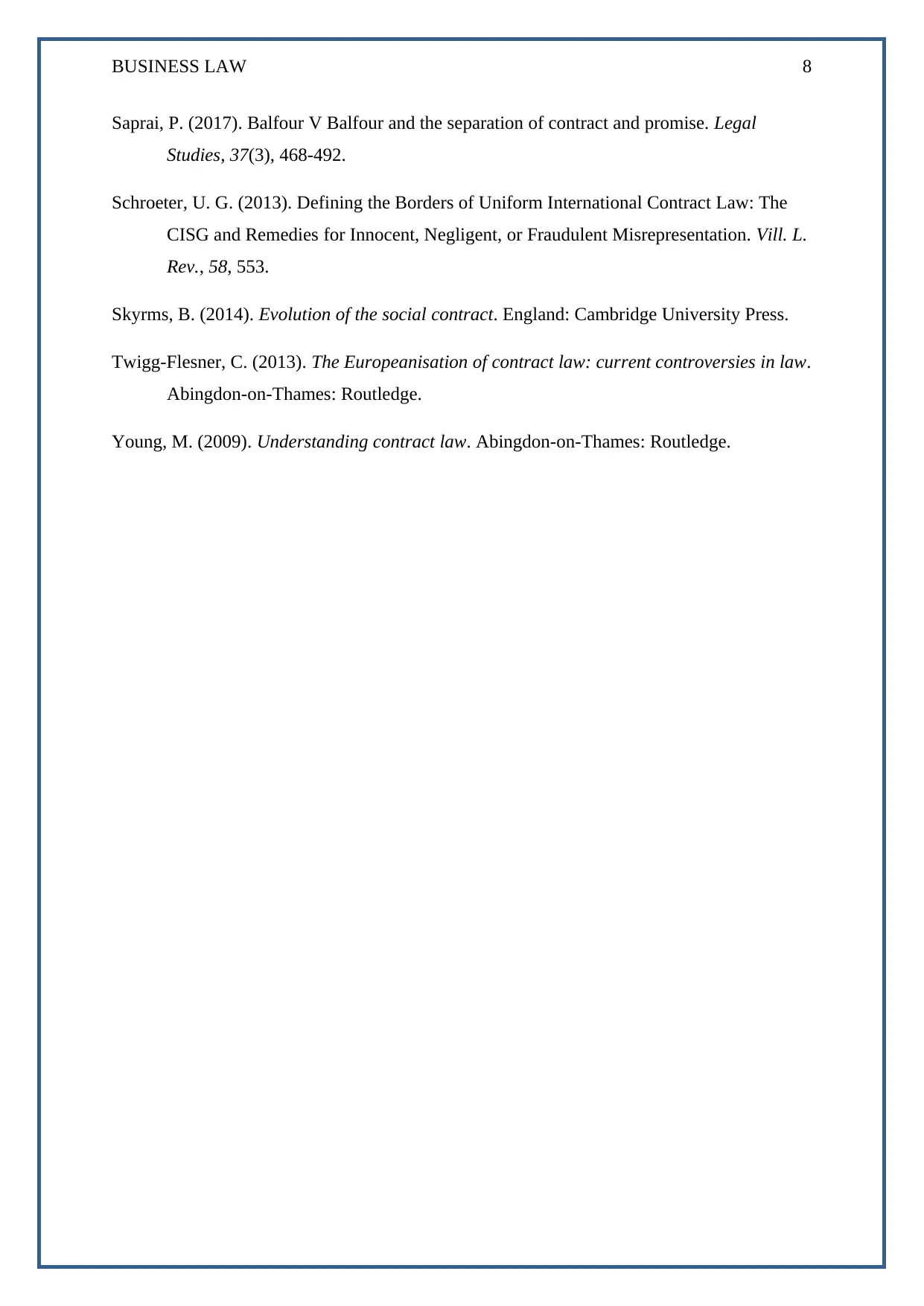
BUSINESS LAW 8
Saprai, P. (2017). Balfour V Balfour and the separation of contract and promise. Legal
Studies, 37(3), 468-492.
Schroeter, U. G. (2013). Defining the Borders of Uniform International Contract Law: The
CISG and Remedies for Innocent, Negligent, or Fraudulent Misrepresentation. Vill. L.
Rev., 58, 553.
Skyrms, B. (2014). Evolution of the social contract. England: Cambridge University Press.
Twigg-Flesner, C. (2013). The Europeanisation of contract law: current controversies in law.
Abingdon-on-Thames: Routledge.
Young, M. (2009). Understanding contract law. Abingdon-on-Thames: Routledge.
Saprai, P. (2017). Balfour V Balfour and the separation of contract and promise. Legal
Studies, 37(3), 468-492.
Schroeter, U. G. (2013). Defining the Borders of Uniform International Contract Law: The
CISG and Remedies for Innocent, Negligent, or Fraudulent Misrepresentation. Vill. L.
Rev., 58, 553.
Skyrms, B. (2014). Evolution of the social contract. England: Cambridge University Press.
Twigg-Flesner, C. (2013). The Europeanisation of contract law: current controversies in law.
Abingdon-on-Thames: Routledge.
Young, M. (2009). Understanding contract law. Abingdon-on-Thames: Routledge.
⊘ This is a preview!⊘
Do you want full access?
Subscribe today to unlock all pages.

Trusted by 1+ million students worldwide
1 out of 9
Related Documents
Your All-in-One AI-Powered Toolkit for Academic Success.
+13062052269
info@desklib.com
Available 24*7 on WhatsApp / Email
![[object Object]](/_next/static/media/star-bottom.7253800d.svg)
Unlock your academic potential
Copyright © 2020–2026 A2Z Services. All Rights Reserved. Developed and managed by ZUCOL.




